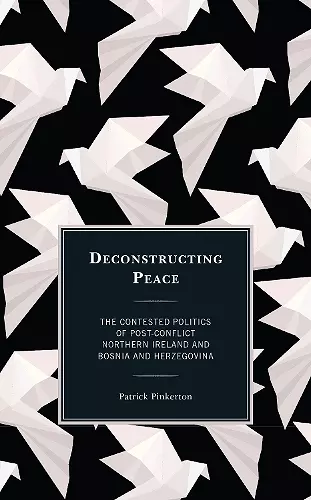Deconstructing Peace
The Contested Politics of Post-Conflict Northern Ireland and Bosnia and Herzegovina
Format:Paperback
Publisher:Rowman & Littlefield
Published:15th Mar '23
Currently unavailable, and unfortunately no date known when it will be back

This book develops a novel approach to peace and conflict studies, through an original application of the philosophy of Jacques Derrida to the post-conflict politics of Northern Ireland and Bosnia and Herzegovina. Based on new readings of the peace agreements and the post-conflict political systems, the book goes beyond accounts that present a static picture of ‘fixed divisions’ in these cases. By exploring how formal electoral politics and the informal political spheres of artistic, cultural, judicial and protest movements already contest the politics of division, the book argues that the post-conflict political systems in Northern Ireland and Bosnia and Herzegovina are in a process of deconstruction. The text adds to the Derridean lexicon by developing the idea of a ‘deconstructive conclusion’, which challenges historical understandings of conflicts at the same time as challenging their consequences in the present. The study provides a critical contribution to peacebuilding and International Relations literature, by demonstrating how Derridean concepts can be utilised to provide fresh understandings of conflict and post-conflict situations, as well as allowing for political interventions to be made into these processes.
In this loosely constructed but tightly argued comparative study of post-conflict Northern Ireland and Bosnia and Herzegovina, Pinkerton critically interrogates the dysfunctionalities associated with mediated peace settlements that tend to harden rather than heal political divisions. Drawing on the work of Jacques Derrida, often cited as the "father of deconstruction," Pinkerton explores the unstable and therefore contingent nature of supposedly entrenched communal and political divisions. His contribution to the peacemaking and peacebuilding literature is to view such dysfunction not as inevitable or immutable but as an expression of a dialectic process between the forces of entrenchment and those that counteract and contradict them. In short, Pinkerton views the formal structures of peace arrangements as coexisting and interacting with informal political domains such as cultural, artistic, judicial, and protest movements. In Derridean terms, Pinkerton envisions a "deconstructive conclusion" that reframes the politics of past and present to enhance the possibilities of transformation going forward. Scholars and practitioners in many fields will benefit from reading this penetrating, provocative book. Well researched, thoroughly documented, and critically presented, it is a groundbreaking resource for university libraries and collections specializing in war, peace, security studies, and international affairs. Essential. Upper-division undergraduates. Graduate students, faculty, and professionals. General readers.
* Choice Reviews *Theoretically sophisticated but highly readable, this book deftly dissects the Northern Irish and Bosnian peace processes. Analysing the contradictory understandings of conflict embedded in both the Dayton and Good Friday Agreements and the problematic ways in which these understandings are seemingly reconciled, Pinkerton provides a persuasive account of how the dysfunctional politics of both places might be transformed.
-- Laurence Cooley, Lecturer in the Department of International Development, University of BirminghamThe contemporary struggles of Bosnian and Northern Irish politics emerge when peace is not the opposite of conflict but a different and deferred version of that same conflict. This central contention of Pinkerton's masterful book is, by turns, devastating and hopeful in its implications. It makes for crucial reading in the fields of peacebuilding, conflict studies, and poststructural politics or for anyone interested in troubling our understandings of ‘ethnic’ and ‘communal’ violence and peace.
-- Dan Bulley, Oxford Brookes UniversityDeconstructing Peace offers a fresh look at apparently intractable conflicts, drawing on Derridean thought. This sophisticated book powerfully argues that the dysfunctional politics that continue to reinscribe division cannot be overcome without fundamentally challenging established narratives of conflict. Importantly, it is driven by the ambition not just to analyze but also to show how novel interventions might be made.
-- Maja Zehfuss, University of CopenhISBN: 9781538153345
Dimensions: 224mm x 154mm x 15mm
Weight: 295g
194 pages